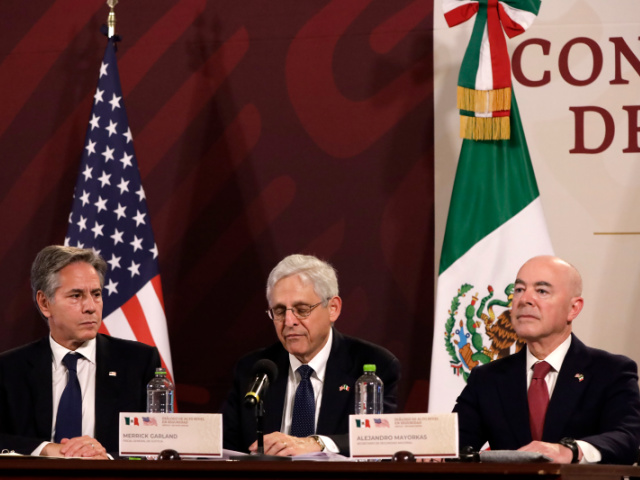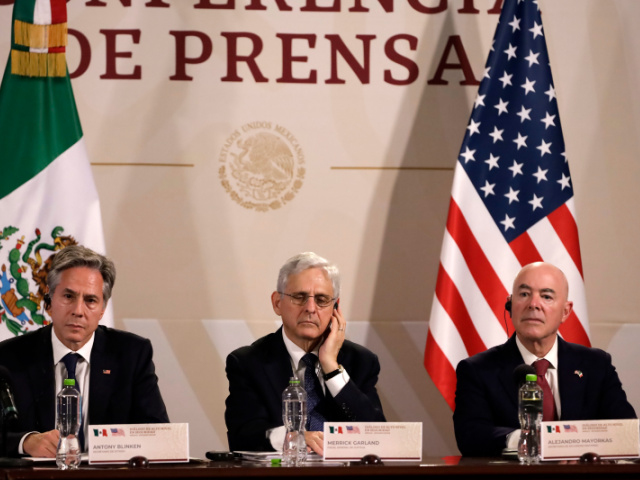President Joe Biden’s deputies are offering multiple concessions to Mexican President Andres Manuel López Obrador in the hope that he will conceal the huge and unpopular flow of illegal migrants during the 2024 campaign season.
On Thursday, three of Biden’s cabinet secretaries met with Obrador. He has the power to embarrass Biden during the 2024 campaign with massive, televised eruptions of migrants — such as the September 2021 rush of 15,000 Haitians at Del Rio, Texas.

October 5, 2023, Mexico City, Mexico: Antony Blinken, United States Secretary of State; Merrick Garland, Attorney General of the United States; Alejandro Mayorkas, Secretary of Homeland Security of the United States at the press conference within the framework of the High Level Dialogue on Security Mexico – United States at the National Palace in Mexico City (Luis Barron / Eyepix Group/Future Publishing via Getty Images).
He has that power because Biden’s deputies have abandoned their duty to enforce the border law and have, instead, triggered a flood of global migrants through Mexico that Mexico’s government can hold or release whenever Obrador chooses.
U.S. President Joe Biden and President of Mexico Andres Manuel Lopez Obrador shake hands during a welcome ceremony as part of the 2023 North American Leaders’ Summit at Palacio Nacional on January 09, 2023, in Mexico City, Mexico (Hector Vivas/Getty Images).
On Thursday, Attorney General Merrick Garland promised Obrador that he would restrict the supply of U.S.-made guns to Mexico’s cartels, saying that U.S. officials “well understand the dangers of the military-grade weapons that are being trafficked to Mexico.”
The U.S. has doubled the capture of guns smuggled to Mexico during the last year, border chief Alejandro Mayorkas told Obrador. Mayorkas is also quietly allowing roughly 50,000 Mexicans per month to cross the border into U.S. jobs and communities.
On September 29, Secretary of State Tony Blinken told Obrador’s foreign secretary that he would simplify trade with Mexico and let Mexicans get jobs in the Congress’s $50 billion effort to build chip factories in Arizona, Ohio, and other states:
We’ll continue to strengthen, to expand, and diversify supply chains in emerging industries like electric vehicles and semiconductors. Today, in fact, we’re launching a joint semiconductor action plan to accelerate our integration, to scale our efforts to attract new investment.
Blinken touted trade — not U.S. opposition to migration or drugs — as the top priority in negotiations:
By creating the right incentives in business environments and harnessing our two nations’ respective strengths, we have a tremendous opportunity to make North America the most competitive, the most productive, the most dynamic region in the world. That’s what this [U.S.-Mexico] dialogue is fundamentally about.
This bargaining policy is very different from President Donald Trump’s 2019 policy.
In 2019, as migrants flooded across his barely-begun border wall, he bypassed his economic deputies and threatened to impose economic sanctions on Mexico. Obrador quickly gave up and curbed the flow of migrants — which proved very popular in Mexico.
Experts, journalists, and immigration advocates acknowledge that Obrador has power over Biden.
“Mexico has real leverage in the relationship with the US. And right now that leverage is around migration,” Andrew Selee, the president of the pro-migration Migration Policy Institute, told CNN for an October 5 article.
“The government of Mexico views their control over immigration as a bargaining chip in any conversation they have with the United States,” Jon Feere, a top enforcement official in President Donald Trump’s government, said. He added:
The U.S. shouldn’t be tolerating any illegal immigration, and it should be very clear that this has to come to a stop. But the Biden administration is controlled by special interests, and they’re not going to go forcefully into Mexico and make demands ….
It’s the optics that they’re concerned about. So if they can manage it by changing the pace at which it occurs or the way in which it occurs, to make it look orderly, that’s good enough for them.
“They think it’s okay to negotiate over our sovereignty,” Feere said.
“López Obrador very quickly understood that if he gave into Biden’s request for support [on migration] he would have significant political capital to ensure that US pressure on [Mexico] … would be constrained,” former Mexican ambassador Arturo Sarukhán told CNN. One sign of Mexican clout, he said, is that Biden’s deputies are silent about several moves by Obrador to roll back democratic rights, he added.
The two countries have quietly negotiated a series of border security arrangements that have largely prevented another Del Rio PR disaster for Biden. The deal includes Mexican protections for a series of corporate-funded shelters in northern Mexico that help migrants rest before they cross the border.
But Mexico’s clout was also displayed when Obrador met on Thursday with three U.S. cabinet secretaries, Ioan Grillo, a Mexican journalist, noted:
Obrador is using his political leverage over Biden to Mexico’s advantage.
For example, Obrador’s deputies have stifled Biden’s tepid efforts to curb the deadly flow of Mexican-made fentanyl into the United States. On Thursday, one of Obrador’s deputies told the Americans that fentanyl is not being manufactured in Mexico.
CBP officers in Nogales seized more than 670K fentanyl pills in two shipments (U.S. Customs and Border Protection/Nogales Port of Entry).
The fentanyl smuggling kills roughly 70,000 Americans each year — but it is a huge money-generator for the cartels, Mexico’s economy, and many corrupt politicians in Mexico.
U.S. Attorney General Merrick Garland was at the meeting — but did not win any drug-related concessions from Mexico.
Biden’s team has failed to win any Mexican curbs on the deadly drug smuggling, partly because they have used their limited leverage with Mexico to hide their efforts to smuggle more than three million global migrants into Americans’ jobs and homes.
Obrador is happy to accelerate migration into the United States — and to boost their political power. In January 2023, for example, he pushed Biden to amnesty Mexicans in the United States:
Just imagine: There are 40 million Mexicans in the United States — 40 million [including people] who were born here in Mexico, [or] who are the children of people who were born in Mexico … I fully trust President Biden … I’ve asked President Biden to insist before the U.S. Congress to regularize the migration situations of millions of Mexicans who have been in the States working, living in the United States, and contributing to the development of that great nation, which is the United States of America.
His foreign secretary, Alicia Barcena, called for even more migration at the September 29 meeting and announced Mexico’s plan to build a multinational alliance for more migration:
Migration is an issue with strong social and economic roots and that is why we have agreed to look at these structural causes of migration. But also, we have seen that the problem on our border – the U.S.-Mexico border, it doesn’t begin there. Really, people are coming from the south. So, we need to have a hemispheric regional perspective to include Ecuador, Colombia, Panama, Venezuela, Haiti, Honduras, Guatemala, Costa Rica. And that is why our president is assuming great leadership in this regard. … We can take control these migratory flows, offer development opportunities, and approve safe and legal pathways. This is essential because we have had a crisis that affected us at our trade crossings as well. So, we need to be very well prepared for this.
Mexico’s plan to create an alliance with Venezuela may also allow Mexico to help U.S. officials implement their new plan to deport some illegal-migrant Venezuelans. The U.S. plan was announced Thursday, but U.S. officials released no details about numbers or timing — perhaps because Mexico has yet to declare the price it will charge to aid the deportations.
Meanwhile, Obrador plays hardball with Biden.
On Thursday, he slammed Biden’s surprise campaign trail decision to build about 17 miles of extra border wall. It is a “step backward,” Obrador complained as he argued that “the poorest countries have to be helped” by migration.
Biden’s officials and their business donors are very eager to get more migrants from Obrador — but only if the huge inflow can be kept orderly and hidden from U.S. voters who are increasingly opposed to both illegal and legal migration.
Biden’s deputies also want to pretend the migrant flood is caused by uncontrollable foreign disasters, not by the Democrat party’s open-border offer of jobs, housing, and government aid to foreign migrants.
“Our two countries are being challenged by an unprecedented level of migration throughout our hemisphere,” Mayorkas told the meeting, adding:
The United States is committed to continuing to work closely with Mexico as we implement a model that pairs a historic expansion of safe, orderly and lawful pathways for migrants to come directly to the United States or elsewhere to obtain humanitarian relief outside the grip of [cartel] smugglers.
In January 2023, the Cuban-born, pro-migration border chief rebuffed Republican demands for an effective anti-drug policy. “We are doing that which needs to be done,” Mayorkas answered.
Since January, at least 50,000 mostly discarded Americans have died from fentanyl as employers open many low-wage jobs for the indebted migrants that are being extracted from poor countries:
